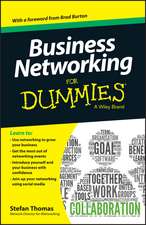(R)Evolution: Organizations and the Dynamics of the Environment
Autor Rob Dekkersen Limba Engleză Hardback – 5 iul 2005
| Toate formatele și edițiile | Preț | Express |
|---|---|---|
| Paperback (1) | 956.81 lei 6-8 săpt. | |
| Springer Us – 28 oct 2010 | 956.81 lei 6-8 săpt. | |
| Hardback (1) | 962.98 lei 6-8 săpt. | |
| Springer Us – 5 iul 2005 | 962.98 lei 6-8 săpt. |
Preț: 962.98 lei
Preț vechi: 1174.36 lei
-18% Nou
Puncte Express: 1444
Preț estimativ în valută:
184.26€ • 192.39$ • 152.50£
184.26€ • 192.39$ • 152.50£
Carte tipărită la comandă
Livrare economică 04-18 aprilie
Preluare comenzi: 021 569.72.76
Specificații
ISBN-13: 9780387261256
ISBN-10: 0387261257
Pagini: 522
Ilustrații: XXX, 522 p.
Dimensiuni: 155 x 235 x 30 mm
Greutate: 0.95 kg
Ediția:2005
Editura: Springer Us
Colecția Springer
Locul publicării:New York, NY, United States
ISBN-10: 0387261257
Pagini: 522
Ilustrații: XXX, 522 p.
Dimensiuni: 155 x 235 x 30 mm
Greutate: 0.95 kg
Ediția:2005
Editura: Springer Us
Colecția Springer
Locul publicării:New York, NY, United States
Public țintă
ResearchDescriere
(R)Evolution studies the adaptation of industrial organisations to the dynamics of the environment by drawing an analogy with evolutionary biology, by extensively studying literature in management science, and by case studies. These investigations have lead to the insight that companies might evolve slower than generally expected; they doubt the effect of reorganizations, as commonly practiced in industry. Additionally, this work proposes the model for the Innovation Impact Point, the model for the Dynamic Adaptation Capability, the model for Collaboration.
Cuprins
Introduction. Stagnation and evolution in industry. Evolution as model for business growth. Research objectives and methodology.- Part I: Evolutionary Models for Organizations. Interaction between organization and environment as evolutionary process. Evolutionary models for genetic variation. Landscape fitness and adaptation. Hypotheses for the evolution of organizations. Concluding evolutionary biology.- Part II: Review of Management Approaches. Technology management and innovation. Process innovation and business process re-engineering. learning organisation and knowledge management. Preluding the dynamic capability. Part III: Framework for Dynamic Adaptation Capability. Development of framework for adaptation. Application on strategic capacity management. Case studies.- Epilogue.- Conclusions.- Recommendations.
Textul de pe ultima copertă
Rob Dekker’s (R)Evolution: Organizations and the Dynamics of the Environment investigates the possible changes needed for industrial organizations to adapt to and remain competitive in their ever evolving environment. (R)Evolution’s main area of contribution to these very complex issues is embedded in the work’s ambitious attempt to borrow from evolutionary biology and genetics not only metaphors but also concepts and models to be adapted to the management of business organizations. The work provides us with a comprehensive vision of adaptation and variation in the business community, integrating various intellectual inputs which are based on an evolutionary vision of economic behavior. Using an extensive study of the literature in management science, and applying new models and methodologies in numerous case studies, Dekkers draws many insightful conclusions including the claim that companies often evolve slower than generally expected. Furthermore the research calls into question the effectiveness of the common practice of corporate reorganization. Embracing and merging most major contemporary developments in the theories of change into a comprehensive integrated approach, (R)Evolution is an invaluable resource for researchers specializing in the management of technological change.
Caracteristici
R)Evolution has studied the adaptation of industrial organizations to the dynamics of the environment by drawing an analogy with evolutionary biology
Provides an extensive literature survey of industrial management as well as providing practical recommendations for implementation in industrial companies
Provides an extensive literature survey of industrial management as well as providing practical recommendations for implementation in industrial companies












